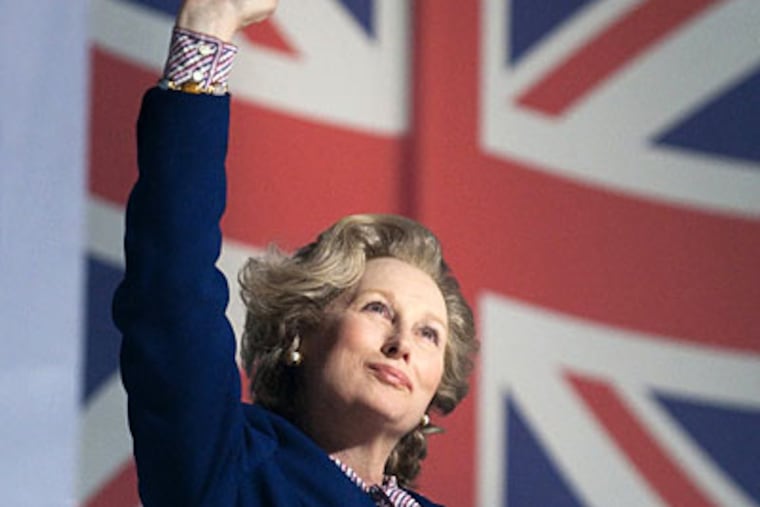All hail Streep as 'The Iron Lady'
Is there anything - make that anyone - Meryl Streep cannot do? She's been a distraught Aussie (A Cry in the Dark), a Danish baroness (Out of Africa), an Oklahoma nuclear power plant worker (Silkwood), a Jew in the Holocaust (Sophie's Choice), a colorfully eccentric foodie (Julie & Julia), and a French lieutenant's woman.

Is there anything - make that anyone - Meryl Streep cannot do? She's been a distraught Aussie (A Cry in the Dark), a Danish baroness (Out of Africa), an Oklahoma nuclear power plant worker (Silkwood), a Polish Catholic in the Holocaust (Sophie's Choice), a colorfully eccentric foodie (Julie & Julia), and a French lieutenant's woman.
She's been Irish and Iowan. She's even been a landscape-painting fox.
Streep's gift for accents, her ability to observe and assimilate, have landed her more Oscar nominations than any actor in Academy history. It's tempting to make a joke of it all, really - how can anyone be that good, that adept at crawling into the skin of another person, real or imagined?
You want to mock, or at least poke a little polite fun at her.
And then you see The Iron Lady - a brave and bittersweet portrait of Margaret Thatcher, one of the 20th century's most daunting and controversial political figures - and you sit there in awe. It doesn't matter what you make of the British prime minister's approach to governance (her 11-year run: 1979-90), her stubbornness and her social policies - yea or nay, love or hate, the portrait that Streep delivers in Phyllida Lloyd's impressionistic biopic is astonishing.
For the first 30 minutes of The Iron Lady, at least, Streep is Thatcher as an aged, unsteady woman, wandering her London flat, talking to her husband, Dennis (Jim Broadbent), who happens to be a figment of her imagination. He died in 2003. Many, many months have passed. She still keeps his suits in the closet, his place at the table.
Here is a woman who once stood shoulder to shoulder with Ronald Reagan, who declared war on Argentina (remember the Falklands?), who broke the British trade unions and battled the Irish Republican Army - staring off into space, fussing with tea towels at the kitchen sink, listening to voices in her head.
The Iron Lady, written by Abi Morgan and using John Campbell's two-volume biography as its primary source, does flash back to Thatcher's days as the daughter of a grocery store proprietor, her first run at political office in 1951, when she was hardly taken seriously by the local Conservative Party bigwigs. (Alexandra Roach is the young Margaret.) She wasn't taken all that seriously, either, when she won her first parliamentary seat, in 1959 - Britain's political world was chauvinist, and classist. So, the through-story in Thatcher's career is her determination to break into the men's club - and then to become its chief operating officer. With Dennis at her side, but fueled by her own defiant certitude, Thatcher stormed on.
The Iron Lady toggles back and forth in time, mirroring the restless maunderings of the widowed Dame Thatcher's memory. By the terms of its own narrative structure, then, the film is about a woman whose life is behind her - whose greatest accomplishments and contretemps are all in the past.
But this mentally frail soul is stuck in the here and now - a here and now with little to offer. The epic struggle these days is to simply hang on to her dignity. It's terribly sad, and terribly moving.EndText